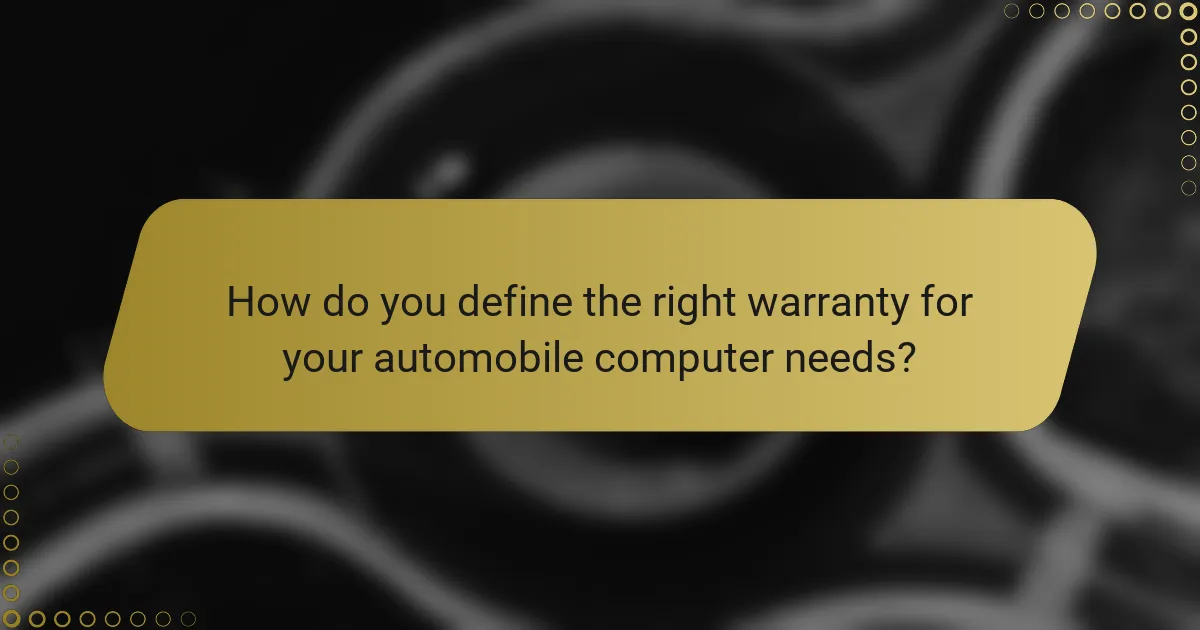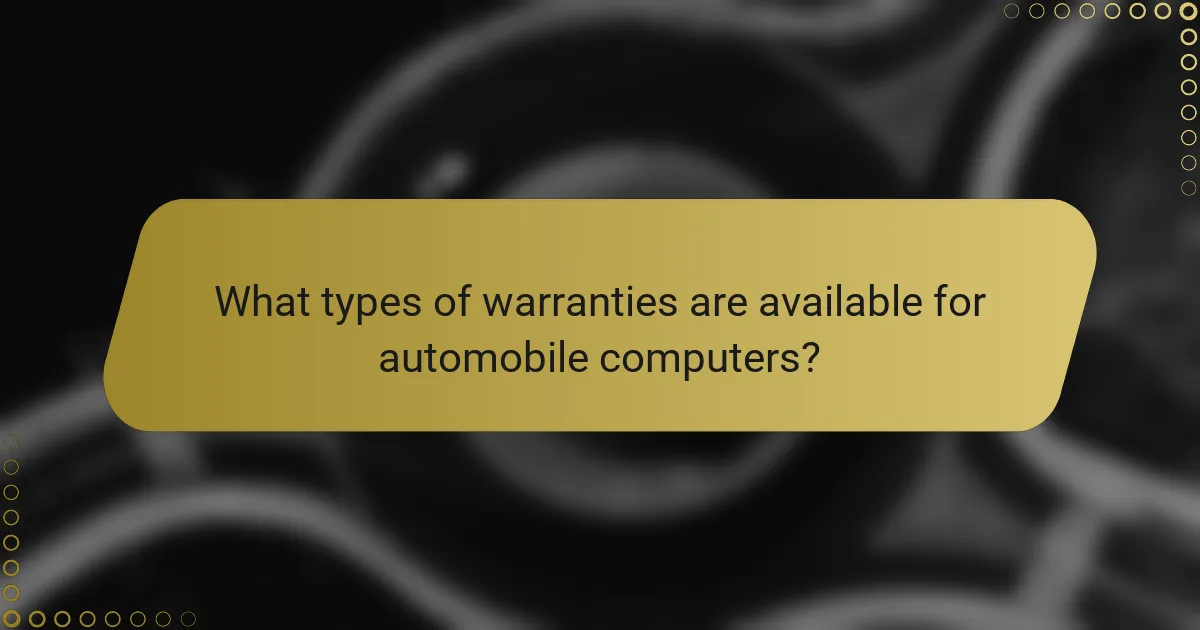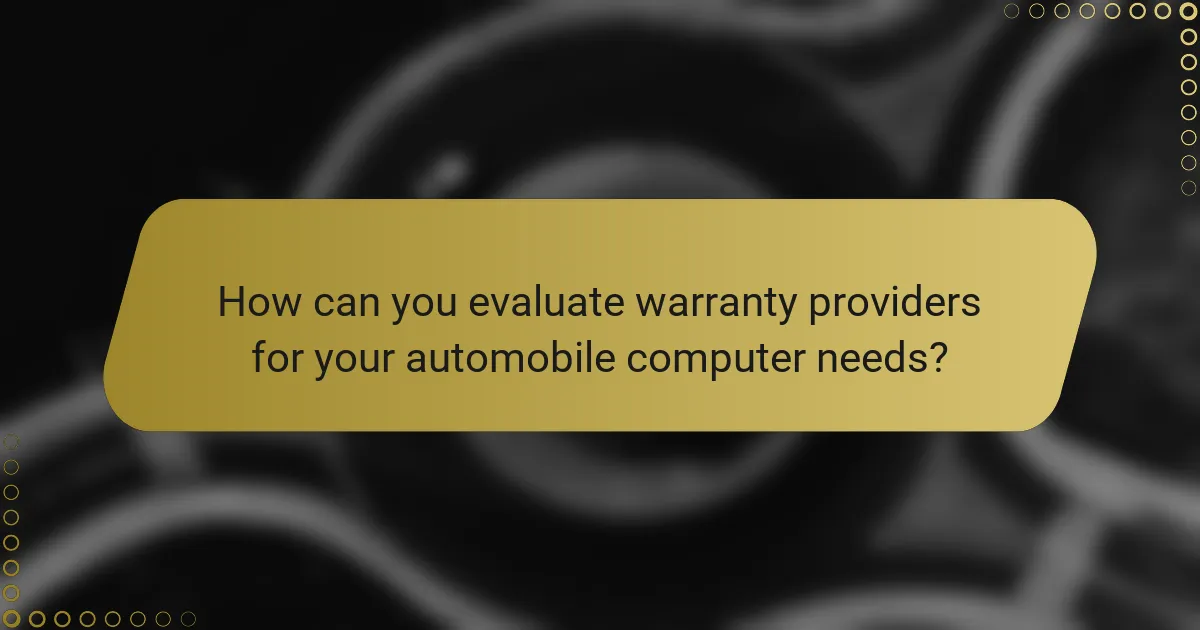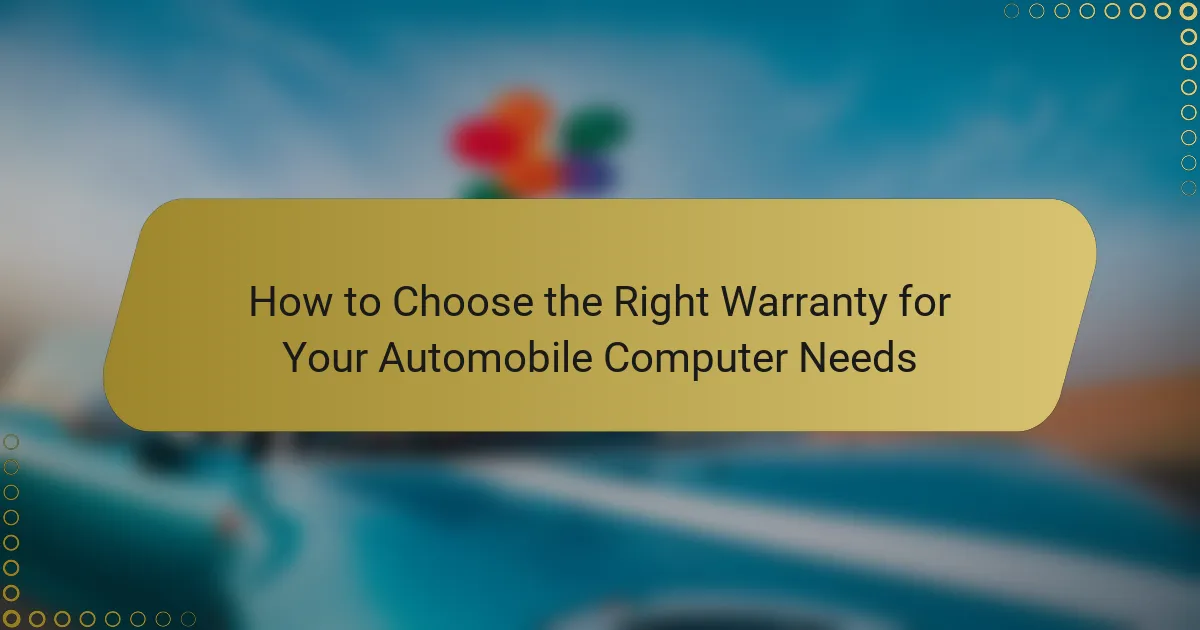Choosing the right warranty for automobile computer needs is crucial for ensuring adequate coverage and protection. This article outlines the specifics of various warranty types, including manufacturer’s warranties, extended warranties, and third-party warranties, highlighting their terms, conditions, and coverage limits. Key factors to consider include the warranty’s duration, transferability, and the reputation of the warranty provider, particularly regarding customer service and claims processing. Additionally, it emphasizes the importance of evaluating coverage options that specifically protect electronic components and systems, as well as the need for a transparent claims process to enhance customer satisfaction.

How do you define the right warranty for your automobile computer needs?
To define the right warranty for your automobile computer needs, consider coverage specifics and duration. A comprehensive warranty should cover parts and labor for repairs related to the vehicle’s computer system. Look for warranties that include protection against defects and failures. Evaluate the duration of the warranty, as longer terms often provide better security. Check if the warranty is transferable, which can increase the vehicle’s resale value. Research the warranty provider’s reputation for customer service and claims processing. According to a 2022 Consumer Reports survey, 70% of consumers prefer warranties with clear terms and responsive support. This data highlights the importance of understanding warranty details before purchase.
What are the key components of an automobile computer warranty?
Key components of an automobile computer warranty include coverage details, duration, and exclusions. Coverage details specify which parts and services are included. Duration indicates how long the warranty is valid, often ranging from one to several years. Exclusions outline what is not covered, such as damage from misuse or accidents. Additionally, transferability allows the warranty to be passed to a new owner. Claim procedures detail how to file a claim for repairs or replacements. Understanding these components ensures informed warranty selection and usage.
What specific coverage options should you look for in a warranty?
Look for coverage options that include parts, labor, and diagnostics. Comprehensive warranties should cover major components like the engine and transmission. Specific exclusions should be clearly listed to avoid surprises. Consider warranties that offer roadside assistance for emergencies. Look for options that allow for rental car reimbursement during repairs. Ensure the warranty covers pre-existing conditions if applicable. Evaluate the duration and mileage limits of the warranty. Research the provider’s reputation for claims processing and customer service.
How do terms and conditions influence warranty effectiveness?
Terms and conditions significantly influence warranty effectiveness by outlining the scope and limitations of coverage. They define what is included and excluded under the warranty. Specific terms can dictate the duration of the warranty and the conditions for making a claim. For example, a warranty may require regular maintenance to remain valid. Failure to adhere to these terms can void the warranty. Additionally, terms can specify the process for filing claims, impacting the ease of access to warranty benefits. Clear and fair terms enhance customer trust and satisfaction with warranty services. Conversely, vague or overly restrictive terms can lead to disputes and dissatisfaction.
Why is it important to choose the right warranty for your automobile computer?
Choosing the right warranty for your automobile computer is crucial for ensuring protection against unexpected repairs. Automobile computers are complex and can be expensive to replace or repair. A suitable warranty covers these costs, providing peace of mind. It also ensures that you receive quality service from authorized technicians. Selecting the wrong warranty may lead to inadequate coverage or high out-of-pocket expenses. According to industry reports, the average repair cost for automobile electronics can exceed $1,000. Thus, a proper warranty can save significant money in the long run.
What potential risks are associated with inadequate warranty coverage?
Inadequate warranty coverage poses several risks for consumers. First, it can lead to significant out-of-pocket expenses for repairs. For instance, if a critical component fails and is not covered, replacement costs can be substantial. Second, limited warranty coverage may result in reduced access to quality service. This can leave consumers reliant on less experienced technicians or unauthorized repair shops. Third, inadequate coverage can lead to prolonged vehicle downtime. This impacts daily activities and may result in lost income. Additionally, consumers might face challenges in resale value. A vehicle with insufficient warranty history may be less attractive to potential buyers. Lastly, inadequate warranty may leave consumers vulnerable to fraudulent practices. Without proper coverage, consumers may be unable to dispute unfair charges or service claims. These risks highlight the importance of selecting comprehensive warranty coverage.
How can a proper warranty save you money in the long run?
A proper warranty can save you money in the long run by covering repair costs. When an automobile computer malfunctions, repairs can be expensive. A warranty often includes parts and labor, reducing out-of-pocket expenses. For example, average repair costs for automotive electronics can exceed $1,000. With a warranty, you may only pay a small deductible. Additionally, warranties can increase the resale value of your vehicle. Buyers often prefer vehicles with remaining warranty coverage. This can lead to a higher sale price and quicker sales. Thus, a proper warranty mitigates financial risk and enhances overall value.
What factors should you consider when selecting a warranty?
When selecting a warranty, consider coverage, duration, and cost. Coverage defines what repairs or replacements are included. It is crucial to ensure essential components are protected. Duration refers to how long the warranty is valid. A longer duration often provides better protection. Cost involves the price of the warranty in relation to the potential repair expenses. Evaluate the warranty against the average repair costs for the specific automobile model. Additionally, check the reputation of the warranty provider. A reliable provider enhances the value of the warranty. Lastly, understand the terms and conditions. Clarity in terms prevents misunderstandings during claims.
How does the age and condition of your automobile affect warranty choice?
The age and condition of your automobile significantly influence warranty choice. Newer vehicles typically qualify for comprehensive manufacturer warranties. These warranties cover a wide range of repairs and services. Older vehicles may require aftermarket warranties, which often have limited coverage. The condition of the automobile also plays a crucial role. A well-maintained car may secure better warranty terms. Conversely, a vehicle with existing issues may face higher premiums or exclusions. Statistics show that vehicles less than five years old are more likely to receive favorable warranty options. Therefore, assessing both age and condition is essential for selecting an appropriate warranty.
What role does your driving habits play in warranty selection?
Driving habits significantly influence warranty selection for automobiles. Frequent long-distance driving may necessitate a more comprehensive warranty. This is because higher mileage can lead to increased wear and tear on vehicle components. Conversely, if driving is primarily local and infrequent, a basic warranty may suffice. Additionally, aggressive driving habits can result in a higher likelihood of mechanical issues. This could make a more extensive warranty beneficial for those drivers. Studies indicate that vehicles driven under severe conditions often experience more failures, supporting the need for robust coverage. Therefore, understanding driving habits is crucial in choosing an appropriate warranty.

What types of warranties are available for automobile computers?
There are several types of warranties available for automobile computers. These include manufacturer’s warranties, extended warranties, and third-party warranties. Manufacturer’s warranties typically cover defects in materials and workmanship for a specific period. Extended warranties offer coverage beyond the manufacturer’s warranty, often for additional years or miles. Third-party warranties are provided by independent companies and may offer more flexible coverage options. Each warranty type has different terms, conditions, and coverage limits. Understanding these options helps consumers choose the right warranty for their automobile computer needs.
What are the differences between manufacturer warranties and third-party warranties?
Manufacturer warranties are provided by the product’s original manufacturer, while third-party warranties are offered by independent companies. Manufacturer warranties typically cover defects in materials and workmanship for a specific period. These warranties are often included in the purchase price of the product. Third-party warranties may cover a broader range of issues, but they usually come with additional costs. Manufacturer warranties are generally more reliable because they are backed by the original maker. Third-party warranties may have more exclusions and limitations. Customers should review the terms and conditions of each type to understand coverage. Understanding these differences helps consumers make informed warranty choices for automobile computers.
How do manufacturer warranties typically cover automobile computer issues?
Manufacturer warranties typically cover automobile computer issues by providing repair or replacement services for defective components. These warranties often include coverage for the vehicle’s onboard computer systems, which control various functions. The coverage usually lasts for a specified period or mileage, such as three years or 36,000 miles. In addition, manufacturers may offer extended warranties that further protect against computer malfunctions. Specific terms can vary by manufacturer and model, so it’s essential to review the warranty documentation. Most warranties also exclude coverage for damage caused by external factors, such as accidents or modifications. This information is usually detailed in the warranty booklet provided at the time of purchase.
What advantages do third-party warranties offer for automobile computers?
Third-party warranties for automobile computers provide several advantages. They often offer lower premiums compared to manufacturer warranties. This can result in significant cost savings for vehicle owners. Third-party warranties may cover a broader range of issues. They often include components not covered by standard warranties. Flexibility in choosing service providers is another advantage. Owners can select from a network of repair shops. Additionally, many third-party warranties provide additional perks. These can include roadside assistance or rental car coverage. Overall, these warranties enhance peace of mind for vehicle owners.
What are the common exclusions found in automobile computer warranties?
Common exclusions in automobile computer warranties include damage from accidents, misuse, and unauthorized repairs. Warranties typically do not cover wear and tear or routine maintenance. Additionally, modifications to the vehicle can void warranty coverage. Environmental damage, such as flooding or extreme temperatures, is often excluded. Software issues may also not be covered unless specified. Furthermore, damage caused by electrical surges is generally not included. These exclusions are standard in warranty agreements to limit liability. Understanding these common exclusions helps consumers make informed decisions.
Which specific damages or failures are often not covered?
Specific damages or failures often not covered by automobile warranties include wear and tear, cosmetic damage, and pre-existing conditions. Warranties typically exclude routine maintenance items like oil changes and brake pads. Additionally, damage from accidents, misuse, or modifications is usually not covered. Environmental factors, such as corrosion from road salt, may also fall outside warranty protection. These exclusions are common across many warranty agreements. Understanding these limitations helps consumers make informed decisions when selecting a warranty.
How can understanding exclusions help in warranty selection?
Understanding exclusions is crucial for effective warranty selection. Exclusions outline what is not covered by a warranty. By knowing these details, consumers can avoid unexpected costs. They can identify potential gaps in coverage. This knowledge helps in comparing different warranty options. It enables informed decisions based on specific needs. For instance, a warranty may exclude damage from improper installation. Recognizing such exclusions can prevent future financial burdens. Understanding exclusions ultimately leads to better protection for automobile computer systems.

How can you evaluate warranty providers for your automobile computer needs?
To evaluate warranty providers for your automobile computer needs, assess their coverage options. Look for warranties that specifically include electronic components and systems. Verify the duration of coverage offered by the provider. A longer warranty period typically indicates greater confidence in the product. Check for exclusions that may limit coverage on specific parts or issues. Research customer reviews and ratings to gauge provider reliability. Compare warranty costs against the benefits provided. Ensure that the provider has a clear claims process. A transparent and efficient claims process enhances customer experience and satisfaction.
What criteria should you use to assess warranty providers?
Assess warranty providers based on coverage, terms, and reputation. Coverage should include specific components relevant to automobile computers. Terms must be clear regarding duration and limitations. Reputation can be assessed through customer reviews and industry ratings. Look for providers with a history of fulfilling claims efficiently. Verify if they offer additional services like roadside assistance or technical support. Check for any exclusions that may affect the warranty’s value. These criteria ensure you select a reliable warranty provider.
How important are customer reviews and ratings in evaluating providers?
Customer reviews and ratings are crucial in evaluating providers. They offer insights into the quality and reliability of services. Positive reviews can indicate customer satisfaction and service effectiveness. Conversely, negative ratings may highlight potential issues. According to a 2020 survey by BrightLocal, 87% of consumers read online reviews for local businesses. Additionally, 73% of consumers trust a business more after reading positive reviews. This data underscores the significance of customer feedback in decision-making.
What questions should you ask potential warranty providers before purchasing?
What questions to ask potential warranty providers include: What is covered under the warranty? Understanding coverage helps assess protection level. Ask about exclusions and limitations. These details clarify what is not covered. Inquire about the claim process. Knowing how to file a claim is essential. Ask about the duration of the warranty. This informs you about the protection period. Check if the warranty is transferable. Transferable warranties can enhance resale value. Finally, ask about customer service availability. Good support is crucial during claims.
What are some common pitfalls to avoid when choosing a warranty?
Common pitfalls to avoid when choosing a warranty include not reading the fine print. Many warranties have exclusions that limit coverage. Failing to compare different warranty options can lead to overpaying. Some warranties may not cover specific parts or issues relevant to automobile computers. Ignoring the reputation of the warranty provider can result in poor customer service. It’s essential to check customer reviews and ratings. Additionally, not considering the duration of coverage can lead to gaps in protection. Finally, underestimating the importance of transferability may affect resale value.
How can hidden fees impact your warranty experience?
Hidden fees can significantly diminish your warranty experience. These fees may include costs for service, parts, or administrative charges not clearly outlined in the warranty agreement. When consumers are unaware of these additional costs, they may face unexpected financial burdens during repairs. This can lead to frustration and dissatisfaction with the warranty provider. Moreover, hidden fees can erode trust in the warranty service, making customers hesitant to utilize their coverage. According to a Consumer Reports survey, 60% of consumers reported feeling misled by hidden fees in warranty agreements. Transparency in warranty terms is essential for a positive customer experience.
What should you watch out for in warranty fine print?
Watch out for exclusions and limitations in warranty fine print. Exclusions often specify what is not covered, such as wear and tear or specific parts. Limitations can include time frames for claims or conditions for coverage. Look for clauses that require maintenance records or specific usage conditions. Pay attention to transferability rules if you sell the vehicle. Be aware of deductibles that may apply to claims. Review the process for filing a claim, including required documentation. Understanding these elements helps avoid unexpected costs and ensures adequate protection.
What best practices can help you choose the right warranty for your automobile computer needs?
To choose the right warranty for your automobile computer needs, assess the coverage options available. Look for warranties that specifically include electronic components. Understand the duration of the warranty and ensure it aligns with your vehicle’s expected lifespan. Compare deductibles and service fees associated with claims. Research the reputation of the warranty provider for reliability and customer service. Verify if the warranty is transferable, as this can enhance resale value. Review the terms for exclusions and limitations to avoid surprises. Finally, read customer reviews to gauge satisfaction and claim experiences.
How can thorough research enhance your warranty selection process?
Thorough research enhances your warranty selection process by providing essential information about coverage options. It allows you to compare different warranty providers and their terms. Research helps identify the specific components covered under each warranty. Understanding exclusions and limitations is crucial to avoid unexpected costs. You can also assess the reputation of warranty companies through customer reviews. This insight can reveal the reliability and responsiveness of their claims process. Additionally, research enables you to find the best value for your investment. By exploring various plans, you can select one that aligns with your automobile computer needs.
What tips can help you negotiate better warranty terms?
Research the warranty offerings of competitors. Understanding market standards helps in negotiation. Identify specific terms you want to improve. Focus on duration, coverage, and costs. Be prepared to discuss your usage patterns. This can justify your requests for better terms. Leverage any existing relationships with the dealer or manufacturer. A positive history can strengthen your negotiation position. Finally, remain flexible and open to alternative solutions. This approach can lead to mutually beneficial outcomes.
The main entity of this article is automobile computer warranties. The article provides a comprehensive guide on how to select the right warranty for automobile computer needs, emphasizing key components such as coverage specifics, duration, exclusions, and the importance of customer service. It discusses various warranty types, including manufacturer and third-party options, and highlights the potential risks of inadequate coverage. Additionally, the article outlines best practices for evaluating warranty providers, understanding terms and conditions, and negotiating better warranty terms to ensure optimal protection for automobile computer systems.
